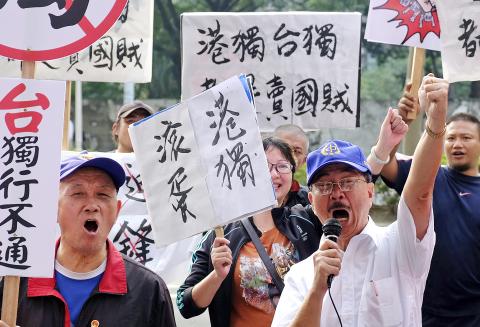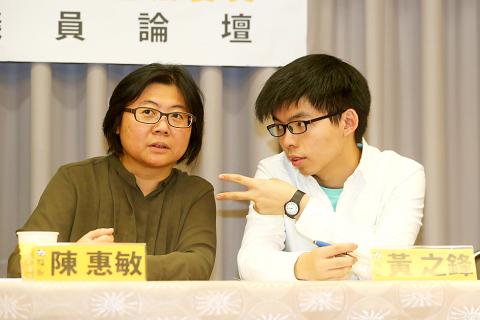Several people wearing masks confronted pro-localization Hong Kong lawmakers who arrived in Taipei in the wee hours of the morning yesterday, sparking allegations of an attempt by the Chinese Communist Party (CCP) to interfere with their meetings in Taiwan.
Hong Kong lawmakers Edward Yiu (姚松炎), Nathan Law (羅冠聰) and Eddie Chu (朱凱迪) arrived at Taiwan Taoyuan International Airport after midnight and were confronted by more than 100 protesters associated with the pro-unification Patriot Association.
Several people wearing masks and black clothes rushed toward the lawmakers as they walked into the airport lobby, shouting at them to leave Taiwan, before a police escort held them back, allowing the lawmakers to make their way to a waiting car.

Photo: AFP / Sam YEH
The incident raised suspicions of CCP involvement to hamper planned exchanges between the lawmakers and the New Power Party (NPP), which invited them to participate in two political forums over the weekend.
“That there would be an attempted assault on Hong Kong legislators when they arrived is quite extreme. I can understand why the CCP is worried about exchanges between Taiwan and Hong Kong, but they should go back and re-examine the cause. The actions of the CCP is the reason there has been so much understanding between Hong Kong and Taiwanese groups in recent years,” said Lin Fei-fan (林飛帆), a prominent Sunflower movement activist, who said he drove the lawmakers to Taipei.
The Patriot Association is widely seen as sympathetic to the CCP and has a history of violent confrontation, most recently attacking Falun Gong practitioners outside the Taipei 101 building.

Photo: CNA
The China Unification Promotion Party (CUPP) has been tied to the Bamboo Union (竹聯幫) crime syndicate, and Lin yesterday accused the Four Seas Gang (四海幫) of also being involved.
More than 300 demonstrators from the CUPP and other groups yesterday protested outside the NPP forum, which was guarded by rows of police officers and barricades blocking the main entrance of the building in Taipei.
Protesters waved signs they said showed a fist smashing into a “Hong Kong-Taiwanese independence alliance.”
Police escorted the lawmakers into the building.
CUPP vice chairman Tseng Cheng-hsing (曾正星) said the protest was intended to “intimidate” the lawmakers and ensure “they do not come back again.”
“Similar protests have taken place in Hong Kong and it is obvious that the CCP has been trying to manipulate patriotic feelings and pin labels on us,” said Law, who denied he supported Hong Kong independence, but promised exchanges with Taiwan would continue.
“Last night was a bit extreme, but it reflected just how low the character of those who oppose exchanges are,” said Joshua Wong (黃之鋒), a Hong Kong activist who is secretary-general of Demosisto, Law’s political party.
Separately, Taipei Mayor Ko Wen-je (柯文哲) yesterday condemned an attempted assault on Wong, saying that violence is not the way to voice opinions in a civilized society.
“I have asked the Taipei Police Department to protect our guests,” he said.
The mayor said the incident could have provided an explanation for why, after the benefits Beijing has given Taiwan, Taiwanese have always been more affiliated with the US than with China.
“Why do Taiwanese fear China so much? I think this is a question Beijing should think about,” he said.
Additional reporting by Peng Wan-hsin and Sean Lin

CHAOS: Iranians took to the streets playing celebratory music after reports of Khamenei’s death on Saturday, while mourners also gathered in Tehran yesterday Iranian Supreme Leader Ayatollah Ali Khamenei was killed in a major attack on Iran launched by Israel and the US, throwing the future of the Islamic republic into doubt and raising the risk of regional instability. Iranian state television and the state-run IRNA news agency announced the 86-year-old’s death early yesterday. US President Donald Trump said it gave Iranians their “greatest chance” to “take back” their country. The announcements came after a joint US and Israeli aerial bombardment that targeted Iranian military and governmental sites. Trump said the “heavy and pinpoint bombing” would continue through the week or as long

TRUST: The KMT said it respected the US’ timing and considerations, and hoped it would continue to honor its commitments to helping Taiwan bolster its defenses and deterrence US President Donald Trump is delaying a multibillion-dollar arms sale to Taiwan to ensure his visit to Beijing is successful, a New York Times report said. The weapons sales package has stalled in the US Department of State, the report said, citing US officials it did not identify. The White House has told agencies not to push forward ahead of Trump’s meeting with Chinese President Xi Jinping (習近平), it said. The two last month held a phone call to discuss trade and geopolitical flashpoints ahead of the summit. Xi raised the Taiwan issue and urged the US to handle arms sales to

State-run CPC Corp, Taiwan (CPC, 台灣中油) yesterday said that it had confirmed on Saturday night with its liquefied natural gas (LNG) and crude oil suppliers that shipments are proceeding as scheduled and that domestic supplies remain unaffected. The CPC yesterday announced the gasoline and diesel prices will rise by NT$0.2 and NT$0.4 per liter, respectively, starting Monday, citing Middle East tensions and blizzards in the eastern United States. CPC also iterated it has been reducing the proportion of crude oil imports from the Middle East and diversifying its supply sources in the past few years in response to geopolitical risks, expanding

OTHER OPTIONS: Given possible US intervention and Taiwanese counterattacks, China might opt to blockade Taiwan or take its outlying islands instead of an all-out invasion A US think tank has urged Taiwan to adopt a “hellscape” strategy that would flood the Taiwan Strait with drones and other uncrewed systems to deter invasion by China. In its report, Hellscape for Taiwan, published on Thursday, the Center for a New American Security said Taipei’s asymmetric defense approach — often described as a “porcupine strategy” — needs to evolve to keep pace with the growing capabilities of the Chinese People’s Liberation Army. The “hellscape” strategy involves saturating the air and waters around Taiwan with thousands of drones and other platforms capable of striking invading forces from multiple domains at once. Long-range